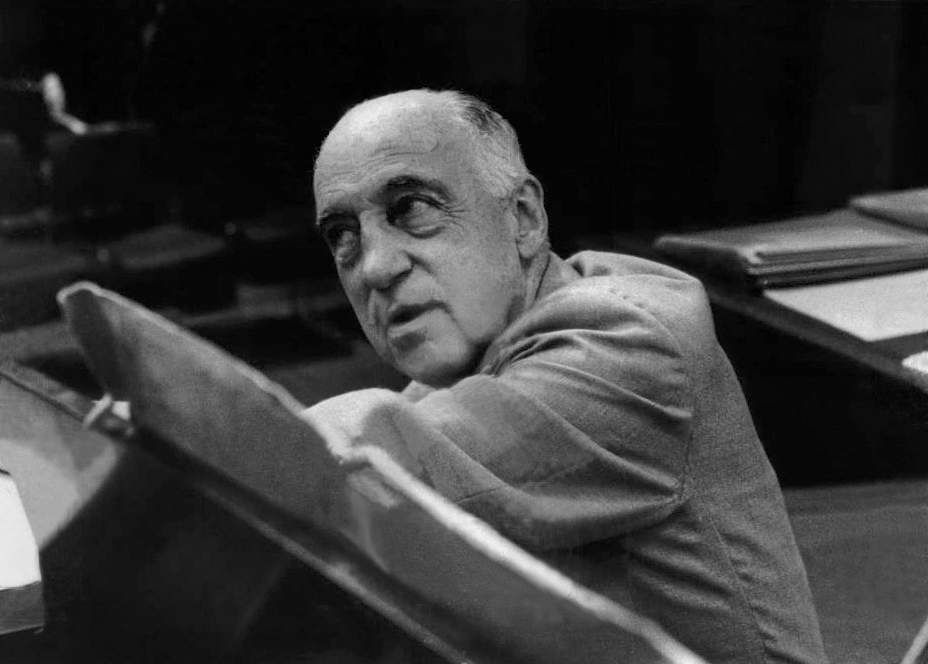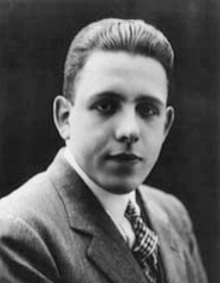1. Overview
Pierre Bernac (born Pierre Bertin; 12 January 1899 - 17 October 1979) was a distinguished French baritone singer, renowned primarily as a leading interpreter of the French mélodie (art song). He is widely celebrated for his profound and influential artistic partnership with the composer and pianist Francis Poulenc, which spanned 25 years and saw Poulenc compose 90 songs specifically for Bernac. Beyond his performance career, Bernac was an acclaimed vocal teacher and author, leaving a significant legacy through his pedagogical methods and his highly regarded books on song interpretation.
2. Life
Pierre Bernac's life was marked by a dedication to music, evolving from an early career in finance to becoming a pivotal figure in French song. This section details his early beginnings, professional debut, personal life, and the circumstances of his passing.

2.1. Early life and education
Born Pierre Bertin in Paris on 12 January 1899, he initially worked in his father's brokerage house. He later adopted the surname Bernac to avoid confusion with the French actor Pierre Bertin. Bernac began his formal musical training relatively late, taking singing lessons at the age of 18. His early teachers included the composer André Caplet. He was subsequently coached by Yvonne Gouverné, who also accompanied him at his first recital in Paris in 1925. Bernac furthered his studies in German Lieder with Reinhold von Warlich in Salzburg. While proficient in German Lieder, he became most celebrated for his interpretations of French mélodie.
2.2. Early career
Bernac made his professional debut as a singer with his first recital in Paris in 1925. Although his career was primarily focused on concert and recital performances, he made two notable excursions into opera. His first operatic appearance was in 1933, performing the role of Pelléas in Claude Debussy's opera Pelléas et Mélisande at the Théâtre des Champs-Elysées. He reprised this role in Geneva in 1936, under the baton of Ernest Ansermet, which marked his only other operatic appearance.
2.3. Personal life
Pierre Bernac did not marry and had no children. His personal life remained largely private, with his career and artistic partnerships forming the central focus of his public persona.
2.4. Death
Pierre Bernac passed away on 17 October 1979, at the age of 80, in Villeneuve-lès-Avignon, France. His death followed a series of heart attacks.
3. Major Activities and Achievements
Pierre Bernac's career was defined by his exceptional artistry as a performer, his profound influence as a teacher, and his significant contributions as a writer on musical interpretation. His most notable achievement was his enduring partnership with Francis Poulenc.
3.1. Partnership with Poulenc

Bernac's name became inextricably linked with that of the composer and pianist Francis Poulenc. Their artistic collaboration began in 1926 with the first performance of Poulenc's Chansons gaillardes. However, their formal musical partnership was established eight years later. In 1934, while Bernac was visiting the Salzburg Festival, he urgently needed an accompanist for a Debussy recital. Knowing Poulenc was also in Salzburg, Bernac sent him a brief note, leading to Poulenc's agreement to accompany him. Their musical rapport was immediate and profound, leading them to form a lasting partnership.
They officially introduced their collaboration to Paris at the École Normale de Musique de Paris on 3 April 1935, premiering Poulenc's Cinq poèmes de Paul Eluard. This partnership continued for 25 years until Bernac's retirement from the concert stage in 1959. During this period, Poulenc composed 90 songs specifically for Bernac, with Bernac's refined artistry significantly influencing Poulenc's compositional style. Poulenc himself acknowledged this, stating that his association with Bernac was the primary reason he wrote so many songs, and that he learned his trade as a melodist by accompanying Bernac in works by composers like Schubert, Schumann, Fauré, Debussy, and Ravel. Poulenc also relied on Bernac's technical advice on vocal matters when composing his opera Dialogues des Carmélites and his later work, Gloria.
Their partnership extended beyond France, with numerous international tours. In November 1935, they performed at the French embassy in London for the Duke and Duchess of York. The following year, they broadcast the first of many recitals on the BBC. Their inaugural British tour in 1939 included four additional cities beyond London. Their American debut was delayed until 1948 due to the Second World War. The New York Times praised Bernac, noting that "the integrity and elegance of his singing quickly won him a following among connoisseurs of art song interpretation." Other notable composers who wrote for Bernac include André Jolivet, Henri Sauguet, and Jean Françaix from France; Paul Hindemith from Germany; Lennox Berkeley from England; and Samuel Barber from the United States.
3.2. Performance activities and repertoire
Bernac was celebrated for his mastery of both French mélodie and German Lieder. His concert career involved extensive international tours and numerous recitals, where he showcased a diverse repertoire. Beyond Poulenc's compositions, their programs included works by prominent French songwriters from the 17th to the 20th centuries, as well as songs by composers such as Brahms, Mompou, Schubert, Schumann, and Verdi. Despite his two operatic ventures, Bernac primarily focused on the concert platform, from which he retired in 1959 at the age of 60.
3.3. Activities as a teacher
In addition to his performing career, Bernac was a highly respected vocal teacher. He conducted masterclasses in France, Britain, and the United States, and was a faculty member at the American Conservatory, Fontainebleau. The Musical Times described him as "an outstanding teacher of song interpretation - visionary, precise, tireless and loving." His pedagogical approach emphasized imagination, personal vision, and unwavering respect for the composer's intentions, stressing the inseparability of text and music in interpretation.
3.3.1. Notable students
Bernac's influence as a teacher is evident in the careers of his many distinguished pupils. Among them, Gérard Souzay is particularly noted, his style owing much to Bernac's example. Other prominent singers who studied with Bernac include Elly Ameling, Grace Bumbry, Mattiwilda Dobbs, Carol Neblett, Jessye Norman, and Bernard Kruysen.
4. Writing Activities
In his retirement, Pierre Bernac authored two highly regarded books that solidified his legacy as an authority on song interpretation and a close confidant of Francis Poulenc. These works offer invaluable insights into the performance of French mélodie and the life and songs of his long-time collaborator.
4.1. The Interpretation of French Song
Published in 1970, The Interpretation of French Song was written by Bernac in English specifically to guide English-speaking singers. The book covers approximately 200 mélodies by 18 composers, ranging from Berlioz to Poulenc. Other composers featured include Gounod, Franck, Lalo, Saint-Saëns, Delibes, Bizet, Massenet, Henri Duparc, Chabrier, Chausson, Fauré, Debussy, Satie, Caplet, Roussel, and Ravel.
The book is structured with three introductory chapters. The first discusses the role of the concert singer and the essence of "interpretation," emphasizing bringing words and music to life while respecting the composer's indications and the unity of text and music. The second chapter provides technical advice on French vowel and consonant sounds and their proper vocal production. The third analyzes the distinctions between the French mélodie and the German lied. The majority of the book consists of detailed analyses of various composers' techniques, offering specific guidance to singers. Reviewers lauded the book; the American journal Notes called it a "masterpiece," and Music & Letters in Britain described it as a "'must' for any serious student of the French repertory."
4.2. Francis Poulenc: The Man and His Songs
Bernac's second book, Francis Poulenc: The Man and His Songs, was published in 1977. Although originally written in French, it was first released in English translation by Winifred Radford, published by Gollancz in London and Norton in New York. The original French text, Francis Poulenc et ses mélodies, was published in Paris the following year.
Following a similar approach to his previous work, the book begins with a concise biographical study of Poulenc, followed by a discussion of the composer's distinctive style and the singer's approach to it. The bulk of the book is dedicated to individual analyses of Poulenc's songs, grouped by the poets whose texts he set. Reviewing the English edition, The Musical Times praised it as "not just a book about Poulenc songs. With its fine literary style... it is an unselfconscious exposé of the spirit of being French, and an object lesson in how to approach any musical repertory with a high degree of rationale, but above all a warm heart." The English edition features a preface by Lennox Berkeley, while the French edition includes one by Henri Sauguet.
5. Legacy and Commemoration
Pierre Bernac's lasting impact on the world of music, particularly in the realm of French song, is profound. His contributions as an interpreter, educator, and author continue to influence singers and scholars.
5.1. Artistic and educational impact
Bernac's artistic legacy is primarily rooted in his definitive interpretations of French mélodie, particularly the works of Francis Poulenc. His close collaboration with Poulenc not only shaped the composer's vocal output but also established a benchmark for the performance of these songs. As an educator, his teaching methods, characterized by precision, vision, and a deep understanding of song interpretation, left an indelible mark on generations of singers. His emphasis on the inseparable connection between text and music, and the importance of imaginative and respectful interpretation, remains a cornerstone of vocal pedagogy. The enduring appreciation for his artistry and the continued study of his teaching principles underscore his significant and lasting influence in the field of song.
5.2. Commemorative prizes and initiatives
To honor Pierre Bernac's achievements and perpetuate his legacy, several initiatives have been established. The Friends of the Académie Ravel in Saint-Jean-de-Luz, France, awards the Pierre Bernac Prize in Song (Prix de chant Pierre Bernac), recognizing excellence in vocal performance. In 1980, "The Friends of Pierre Bernac," a charitable trust dedicated to promoting the reissue of Bernac's recordings, was founded, with Sir Lennox Berkeley serving as its first president. These initiatives ensure that Bernac's contributions to music continue to be recognized and celebrated.